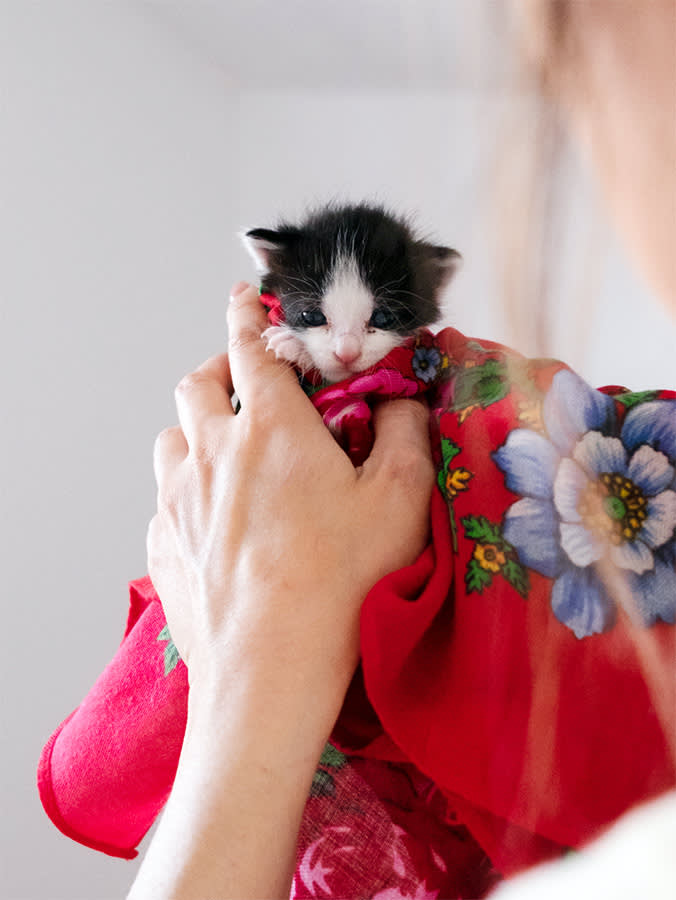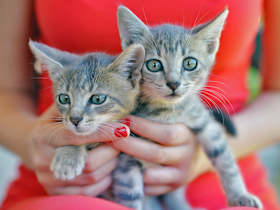by Kelly Villa, | June 12, 2024

Beton Studio / Adobe Stock
Kittens are fragile even in the best health, so it’s important for anyone caring for a kitten to be aware of the serious health issues they can face. Fading kitten syndrome, a condition in which newborn kittens fail to thrive between birth and weaning, is one such issue. Even if a kitten appears strong when born, they can develop fading kitten syndrome symptoms that cause them to “fade” — and even die.
In this article:
Causes of fading kitten syndrome
Fading kitten syndrome can be a result of various genetic, physical, and environmental factors, some of which include:
Congenital abnormalities. A cleft palate can put kittens at risk for developing pneumonia due to inhaling milk, while hydrocephalus, hernias, heart abnormalities, and atresia ani (failure to develop a rectal opening), can also cause issues.
Infection and parasites. Sepsis is the most common cause of death related to fading kitten syndrome, but umbilical infections and infections affecting a kitten’s respiratory or gastric system can be lethal as well. Bacterial pathogens, such as E. coli and bordatella, and viral infections, such as feline herpesvirus-1 and feline calicivirus, also can cause fading kitten syndrome. Kittens may also struggle if exposed to external parasites such as fleas and ticks or internal parasites.
Read this related article on Kinship

How to Care for a Kitten With Fading Kitten Syndrome
Newborn kittens give you lots to worry about. Know the signs of this particular condition.
Malnutrition. Neonatal kittens should nurse every two to four hours. If their mother does not allow them to nurse or doesn’t produce enough milk, or if the kitten experiences hypothermia, the kitten will not get the nutrients they need to thrive. If a kitten misses colostrum, or the first milk produced by a mother cat that provides important antibodies, they are also at heightened risk.
Environmental factors. Neonatal kittens can’t maintain their own body temperature and can suffer adverse effects if their environment is too hot or cold.
Symptoms of fading kitten syndrome
Common symptoms of fading kitten syndrome primarily include low birth weight and/or visible birth defects. Other symptoms that may take time to develop include the inability to nurse, poor appetite, lethargy, dehydration, hypothermia, diarrhea, pale gums, and more.
Treating fading kitten syndrome
To avoid a kitten’s sudden death via fading kitten syndrome, it’s important to treat them with supportive measures that address symptoms including dehydration, low blood sugar, and low body temperature. There is no specific cure for fading kitten syndrome, but treatment may involve assisted feedings, antibiotics, blood transfusions, and other necessary measures.

Kelly Villa
Kelly Villa is a freelance writer and contributor to various pet publications.
Related articles

Adoption Advice
How to Welcome a New Cat—Your New Cat’s First Day

Behavior & Training
How Long Does It Take for a Cat to Get Used to a New Kitten?

Rehome
How Can I Tell If a Stray Cat is Pregnant?


Adoption Advice
Adopting Older Vs. Younger Pets: How to Decide What’s Right for You
Not sure if you should adopt a younger or older pet? Here’s a guide to help you make the best decision.

Adoption Advice
How to Cure Single Kitten Syndrome
Thinking of adopting a cat? Learn more about the risks of single kitten syndrome before choosing an adopted friend.

Behavior & Training
Do Cats Get Littermate Syndrome?

Shelters & Rescue
Are Shelter Pets Healthy?
In truth, most animal shelters will identify and treat a pet’s health problems pretty quickly. They’ll have all the information you need.

Adoption Advice
When To Spay or Neuter A Dog Or Cat
Wondering when to get your pet spayed/neutered? Learn more about the process and the optimal age to get your pet fixed.


Shelters & Rescue
Shelter Myths: Facts About Adopting from a Shelter
Debunk a few animal shelter myths and learn the benefits of adopting from a shelter or rescue group.

Foster & Volunteer
Fostering Pets: Should I Foster a Dog or Cat?
Fostering is a great way to dip your toes into the pet-parenting waters, while helping a pet in need.